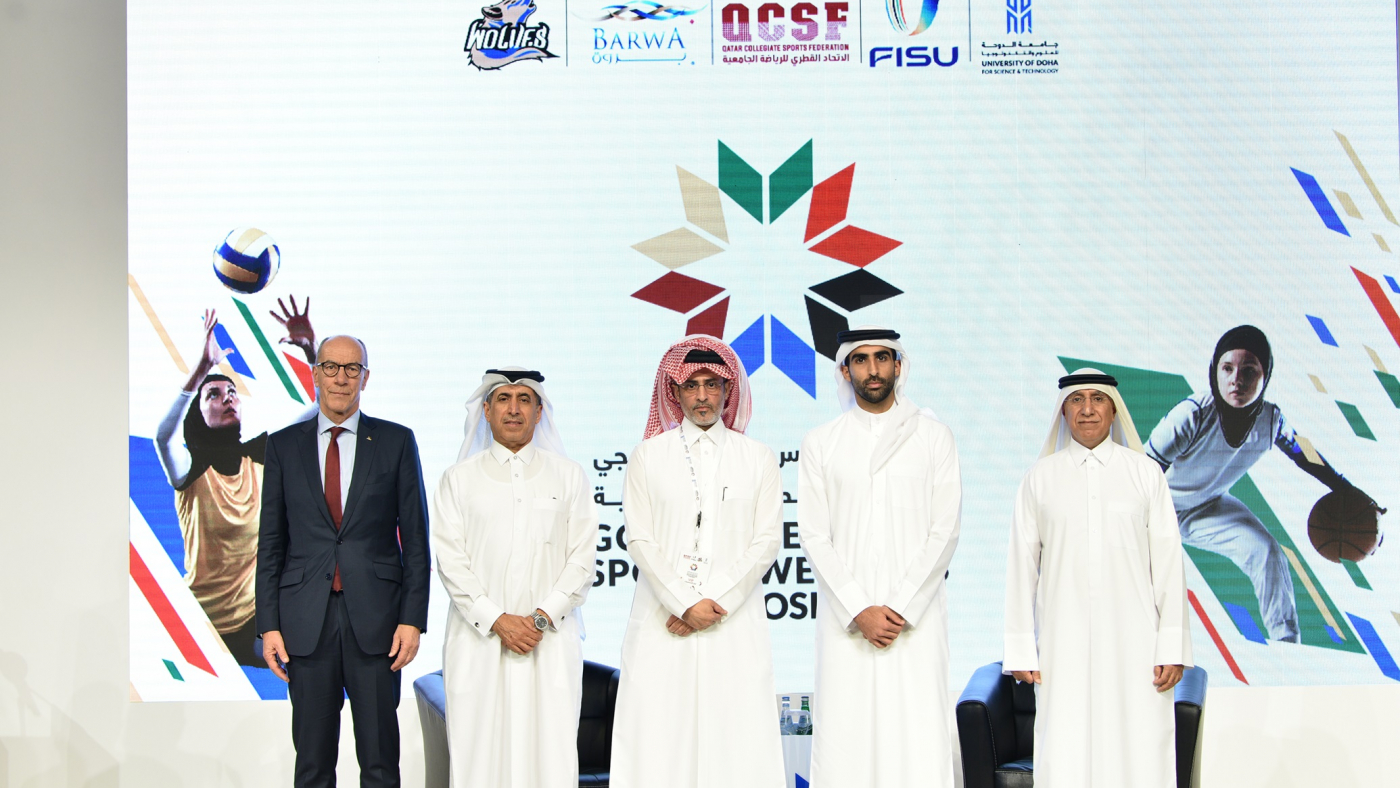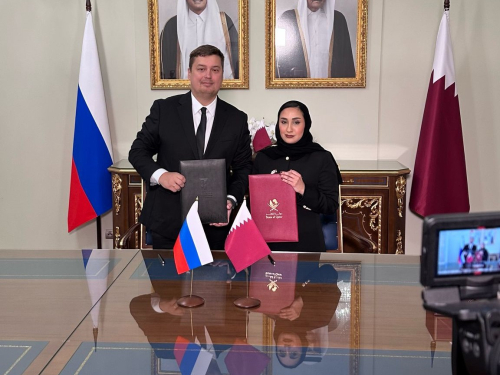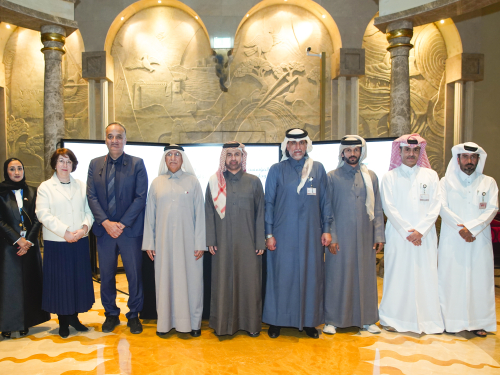
University of Doha for Science and Technology (UDST) proudly opens its doors today for the start of its inaugural GCC Universities Sport and Wellness Symposium. The three-day conference brings together senior university sport and wellness leaders, national and international sport federation representatives, government officials, sport experts and university students from across the region. The conference aims to promote growth and foster collaboration for regional student sport opportunities while exploring the importance of wellness in student setting. Held over 14-16 January, 2024, the symposium is organized by UDST’s Sport and Wellness Department, with the support of active event partners Federation Internationale du Sport Universitaire (FISU), and the Qatar Collegiate Sport Federation (QCSF).
The symposium commenced with opening remarks presented by Dr. Salem Al Naemi, President of UDST, followed by H.E. Dr. Ibrahim Saleh Al-Naimi, President of QCSF and the Undersecretary of the Ministry of Education and Higher Education in Qatar and Leonz Eder, President of FISU and President of the Swiss University Sports Foundation.
H.E. Dr. Ibrahim Saleh Al-Naimi, President of QCSF reiterated the importance of building higher education institutions that play a center-stage role in sports at both regional and global levels. He said: “This symposium, is not just fostering sport and wellness in the educational settings, but also nurturing the holistic well-being of our youth. Integrating sports into our educational fabric ensures that physical wellness and academic achievement go hand in hand. We are pleased with the participation of many high-level delegations from the GCC which underscores the importance of collaboration in building healthier, more vibrant university communities across the region.”
Commenting on the event, Dr. Salem Al-Naemi, President of University of Doha for Science and Technology said: “UDST, in alignment with Qatar National Vision 2030 that embraces sports as a crucial tool for growth and well-being, hosts this event, underscoring Qatar's dedication as a passionate sporting nation. The integration of exercise and wellness into education institutions is essential, and a large part of how our University cultivates well-rounded individuals who thrive in both academic and extracurricular domains. Studies have shown that physical activity could improve focus and attention notably in mathematics and science subjects. Furthermore, sports programs are an important tool for reducing violence and improving student behavior. By hosting this event, we aim to encourage stronger awareness among attendees and achieve an enhanced understanding of how important student wellness is in the post-secondary education sector.”
Mr. Leonz Eder, President of the International University Sports Federation said: “FISU is delighted with the collaboration and participation in the GCC Universities Sport & Wellness Symposium 2024. This event promises to provide a dynamic platform for meaningful discussions on pivotal subjects, including the significance of University Sports within the Gulf region and the myriad benefits of health and well-being through sports engagement in higher education.
We extend our gratitude to UDST, QCSF, as well as national and local authorities of Sport and Higher Education. We also express our appreciation to our distinguished speakers from Qatar and around the world. The topics under consideration, spanning sports competition to the crucial role of Healthy Campus programs in fostering the holistic development of students, will not only strengthen our collective bonds but also leave a legacy that will serve the entire higher education community.”
Many speakers took part in the symposium including Eric Saintrond, Secretary General and CEO of FISU; Prof. Dr. Khalid Almuzaini, President of Saudi Universities Sports Federation (SUSF) and Vice President of Asian University Sports Federation (AUSF); and Fernando Parente, Director of FISU’s “Healthy Campus” Program. The symposium’s keynote speaker is two-time Olympic Medalist Dr. Noemi Zaharia Lung, Director of Sports Leadership and Associate Professor at the United States Sports Academy in Alabama, USA, who will also deliver Day 2’s plenary session about the importance of wellness.
The official theme of the conference is “Towards a Vision of Collaboration and Growth”, with principal focus on exploring collaborative hosting and competition opportunities across the region, productive discussions on the growth of elite sport within the university sector, and the establishment of a multinational network committed to increasing interuniversity sport and wellness initiatives across the GCC. Another major topic of the symposium is the FISU “Healthy Campus” program, which advocates for the holistic development of students’ physical and mental health. UDST’s diverse range of sports programs and services was the first in the MENA region to be recognized by the program and be awarded FISU Platinum status, making it a fitting host for the symposium.
Mr. Tony Martin, Manager of Sport and Wellness at UDST, remarked, “There are over 100 post-secondary institutions already participating in the FISU program, as we are. We hope to inspire more universities to join this transformational wellness initiative, which would elevate the quality of individual university sports for everyone. The GCC region in particular is witnessing a significant shift in the role of higher education institutions in sports development. By bringing together key stakeholders for the first time at such collaborative events as the symposium, I believe UDST is helping to set the stage for a successful future in university sports and wellness.”
The symposium coincides with the ongoing AFC Asian Cup hosted in Qatar, providing the perfect backdrop for discussions on collaboration and competition. In organizing the GCC Universities Sport and Wellness Symposium, UDST and its event partners are bringing a unique opportunity to help shape a robust and sustainable sports and wellness culture for universities in the Gulf – a pioneering approach to student development.






